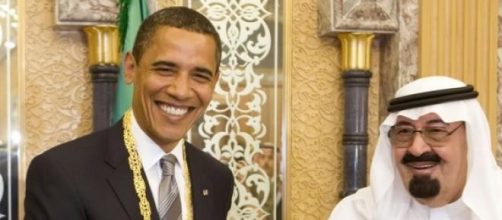I find it extremely hard to digest the ways that politicians are conducting themselves over international affairs. The growing realisation that hypocrisy is not only so conspicuously apparent, it is profusely articulated by the words and endorsements of the leaders of this world, those who are seen as the voices of reason, the upholders of justice. The recent passing of Abdullah bin Abdulaziz Al Saud, king of Saudi Arabia has been met with international sorrow, and most interestingly, from those of a Western persuasion. Here in the UK, the Union Jack was lowered to half mast for the duration of 12 hours in order to honour the former despotic, unelected leader.
How many times do we hear Mr. David Cameron and President Obama proclaim their affinity to ethical humanitarianism, condemning autocratic states for their lack of civil rights and their propensity to enact capital punishment? Yet we now find the Prime Minister and the President on the first plane to Riyadh to partake in the mourning of a nation that beheads roughly 2 people per week. It is the only country in the world in which beheadings are a legal form of punishment, and are given to those who commit apostasy, witchcraft and sorcery.
Consider what has happened recently in France with the Charlie Hebdo attacks, the advocacy for freedom of expression has never been more prevalent through the voice of Western media and politicians.
Now think of the recent sentence handed to Raif Badawi of 10 years and 1000 lashes for encouraging religious and political debate via his blog, and it is clear that this is a firm contradiction of the ethos that has been instilled upon us. Abdullah was known to be a keen reformer, but due to the conservative nature of Saudi Arabia, these cultural constraints prevented him from implementing the majority of his "moderate" policies. Women were finally given the right to vote recently, but are still not allowed to drive, another law that remains exclusive to the Saudi Kingdom.
Such prominent figures as John McCain, stated that King Abdullah was also a "vocal advocate for peace", despite a Wikileaks report exposing his desire for America to launch attacks on Iran over its nuclear programme.
It is worth comparing the reaction of Obama to the death of Hugo Chavez to the death of King Abdullah. Chavez, a democratically elected leader. Obama refers to the death of Chavez by stating that "The United States remains committed to democratic principles, the rule of law, and respect for human rights", including no words of sentiment or regret for his passing. When speaking of Abdullah, he uses emotive language; "It is with deep respect that I express my personal condolences and the sympathies of the American people to the family of King Abdullah... The closeness and strength of the partnership between our two countries is part of King Abdullah's legacy". There is no mention of the lack of human rights and democracy in the Saudi Kingdom, compared to when addressing the passing of the former Venezuelan leader, whose country was the first in the history of the world to abolish capital punishment.
The deciding factor here of course is that Venezuala is not an American ally, as they counter the hegemonic discourse on democracy.
When Obama said that President Assad should step down and "allow a democratic transition to proceed immediately", the comment brought near unanimous international approval. It seems hypocritical that would he not say the same to Saudi Arabia, a country that prohibits freedom of expression, protests and democracy. This type of double standard clearly pertains to the "closeness and strength" of the oil and arms that are imported and exported between the West and Saudi Arabia, as well as the counter terrorism unit they share. The fact that Western powers are able to blur their morality in order to supplement commerce and business, should they have the right to preach on the nature of other authoritarian states if they reap no benefits from them?

